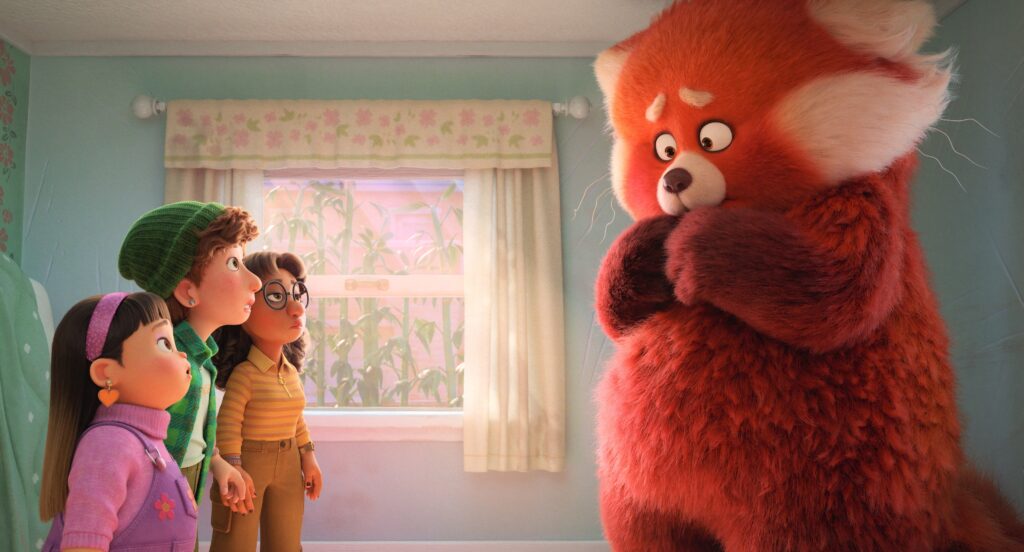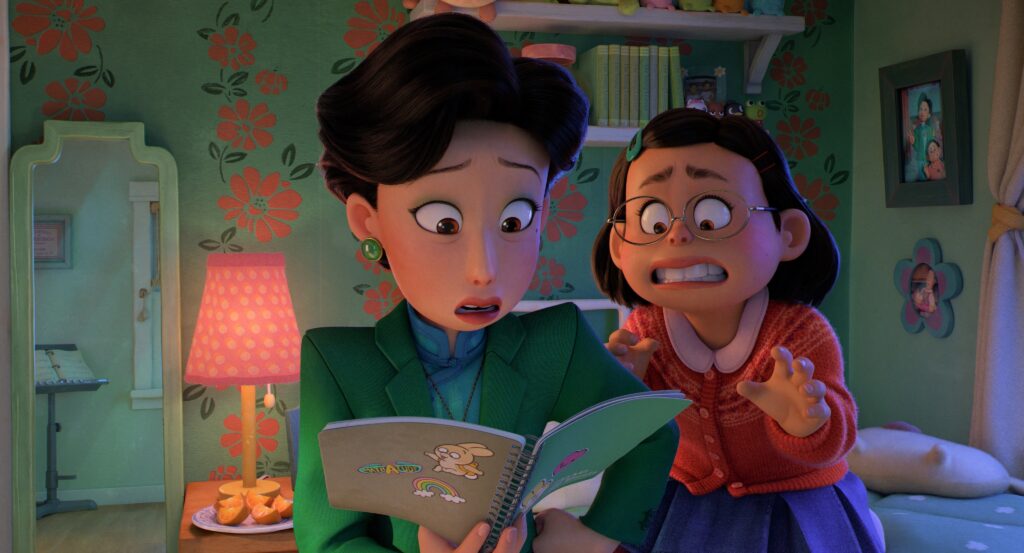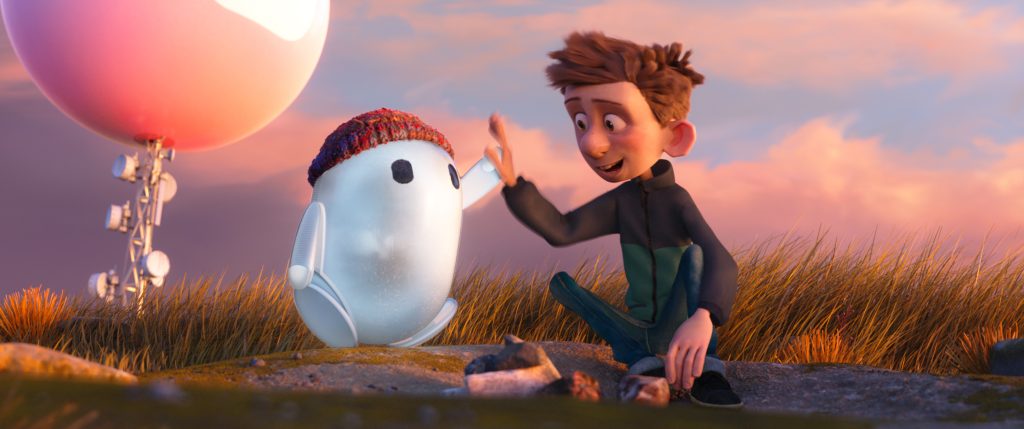March 7, 2022
by Carla Hay

Directed by Domee Shi
Culture Representation: Taking place in Toronto in 2002, the animated film “Turning Red” features a racially diverse cast of characters (Asian, white and a few black people and Latinos) portraying the working-class, middle-class and wealthy.
Culture Clash: Due to an inherited family trait, a 13-year-old girl finds out that she can turn into a giant red panda when she gets very emotional, and she has to decide if she will keep or get rid of this family trait.
Culture Audience: “Turning Red” will appeal primarily to people interested in entertaining but somewhat predictable animated films that are stories about coming of age and about mother-daughter relationships.

The comedic animated film “Turning Red” can at times get too one-note and formulaic in its themes of identity and self-discovery, but the movie has enough offbeat charm to make it a memorable coming-of-age story. The movie explores issues that are familiar to movies about children who are descendants of immigrants, such as whether to follow “old country” traditions or “current country” lifestyles. It’s a story that people of many generations and cultures can enjoy.
“Turning Red” is the feature-film debut of director Domee Shi, who won an Academy Award for Best Animated Short, for her 2018 film “Bao.” According to the “Turning Red” production notes, “Turning Red” (which was co-written by Shi and Julie Cho) is based on a lot of Shi’s real-life experiences as a Canadian child in a Chinese immigrant family. The story, which takes place in Toronto in the spring of 2002, is about a 13-year-old girl who finds her own identity, even when she has people telling her who she should be and what she should do.
The 13-year-old protagonist of “Turning Red” is Meiling “Mei” Lee (voiced by Rosalie Chiang), a smart, obedient and admittedly dorky eighth grader at Lester B. Pearson Middle School in Toronto. Mei is the only child of domineering, overprotective mother Ming Lee (voiced by Sandra Oh) and laid-back and mild-mannered father Jin Lee (voiced by Orion Lee), who both moved to Canada before Mei was born. Ming is the boss of the Lee Family Temple, which is a tourist attraction in Toronto’s Chinatown district. Jin appears to be a stay-at-home father. Mei works part-time as an assistant temple keeper at the Lee Family Temple, where she does menial tasks such as cleaning.
Mei is a self-described overachiever who’s not very popular at school, but she has a tight-knit trio of friends who are students at the same school. Miriam (voiced by Ava Morse) is tomboyish and goofy. Priya (voiced by Maitreyi Ramakrishnan) is bookish and sarcastic. Abby (voiced by Hyein Park) is feisty and hot-tempered. All four girls are somewhat obsessive fans of a boy band named 4*Town, which will be performing an upcoming concert at the Toronto SkyDome, a stadium that can seat 40,000 to 50,000 people. (In real life, the Toronto SkyDome name was changed to Rogers Centre in 2005.)
Because Ming is very strict and suspicious of anything that she thinks could lead Mei to rebel, she won’t let Mei go to the concert. Ming tells Mei that 4*Town’s inoffensive pop music is “filth.” It’s around this time that Mei finds out that the women in her family have inherited a trait where they turn into giant red pandas when they get emotional. When Mei is a panda, she’s about 8 feet tall. Mei discovers this family gene when she wakes up as a giant panda. And later, she predictably turns into a panda when she’s in school, which leads to a humiliating experience.
Mei’s parents tell her that the red panda trait can be suppressed/cured with an ancient ritual during the next red moon, which takes place the following month, on May 25. Meanwhile, Mei finds out that her schoolmates actually like when she transforms into Red Panda Mei, because she’s more spontaneous and fun-loving as a panda. And so, Mei and her three pals come up with a scheme to get enough money to go to the 4*Town concert, which will cost them $200 a ticket. The red panda ritual and the concert are part of a “race against time” aspect to this movie.
“Turning Red” infuses this somewhat simplistic comedic story with more complex commentary about generational traditions and mother-daughter relationships, especially toward the end of the film. Ming expects Mei to put family duties above Mei’s social life, which is why Mei doesn’t hang out with her friends after school as much as she would like to because Mei often has to work at the temple. “Turning Red” has many nods to Eastern culture (which puts emphasis on family/community) and Western culture (which puts emphasis on individuality), as well as the conflicts that can arise when someone, such as Mei, is caught between the contrasts of these cultures.
For example, Ming tells Mei that the red panda trait originated from an ancient female ancestor named Sun Yee, who was a warrior, scholar and poet at a time when women rarely had those roles. During a war, when most of the men were off fighting in the war, Sun Yee prayed to the gods to give her a way to defend her daughter and their village. The gods answered her prayer by giving her the ability to turn into a giant red panda. This ability was passed on to all of Sun Yee’s female descendants. This inherited trait could be considered a blessing for those who see it as good for a community, or it could be seen as a curse for those who see it as bad for an individual.
In the movie’s opening scene, Mei makes a comment that shows how she’s conflicted between the need to get the approval of her family (namely, her mother) and her need to be her own person who can make her own decisions. She says in a voiceover as a montage of her life flashes on screen: “The No. 1 rule in my family: Honor your parents … The least you can do is everything they ask. Honoring your parents is great, but if you take it too far, you might forget to honor yourself.”
Other parts of the movie repeat scenarios where Mei would like to think that she’s independent and free to do what she wants, but then something happens (usually involving Mei’s mother Ming) where Mei is made to feel guilty or pressured to do things that will make her parents proud and honor the family. Ming already has Mei’s life mapped out for her and expects Mei to have a career as secretary-general of the United Nations. Ming is also extremely judgmental and wants to control every aspect of Mei’s life.
For most of the movie, Ming is a caricature of a “helicopter mom,” who hovers and often interferes with Mei’s life to the extent that it causes a series of embarrassments for Mei. For example, when Mei wakes up one morning to find out that she has turned into a giant red panda, Mei is so confused and frightened, she won’t let her parents in her bedroom, but she wails through the door: “I’m a gross red monster!”
Ming misinterprets Mei’s “gross red monster” comment as Mei getting her menstrual period for the first time. That misunderstanding leads to a scene where Ming shows up unannounced at Mei’s school to deliver sanitary pads to her. Much to Mei’s understandable mortification, Ming gets into a fight with a security guard over it in front of Mei and her classmates, while Ming shouts that she just wants to deliver sanitary pads that Mei forgot at home. Of course, Ming eventually finds out the truth, and that’s when Mei’s parents tell Mei about their family’s red panda secret.
It isn’t until the last third of “Turning Red” that Ming stops being a caricature and starts being more of a fully developed character, as some of her human frailties and vulnerabilities emerge. This gradual reveal of Ming’s true character is one of the best aspects of “Turning Red,” which skillfully shows how physical appearances aren’t the only traits that can be passed down through generations. Parenting habits and the ways that parents teach children how to interact with others can also be inherited.
The movie falters a bit in how it introduces a few potential storylines for Mei’s peers, and then just lets those storylines dangle unresolved. There’s a 17-year-old boy named Devon (voiced by Addie Chandler), who’s a heartthrob to Mei, her friends and some of the other girls at Mei’s school. Devon works as a clerk at a convenience store called Daisy Mart. And when Ming finds that Mei has drawn some romantic (non-sexual) fantasy illustrations about Devon in Mei’s sketchbook/journal, Ming goes on a rampage by yelling Devon at his job and wrongfully accusing him of taking sexually advantage of Mei. And then, Devon and his storyline are completely dropped, as if his only purpose in the movie was to be a target of Ming’s misguided parental rants.
Ming also hugely disapproves of Mei’s friend Miriam, for reasons that aren’t made very clear and should have been given better explanation or context. The only explanation put forth in the movie is that Miriam, who likes to skateboard and is comfortable with herself, is perceived by Ming as a threat to Ming’s idea that Mei should be a prim and proper girl. Even though Miriam is a nice person and a supportive friend, Ming has this unsubstantiated idea that Miriam is a troublemaker who’s a bad influence on Mei. At one point in the movie, Miriam briefly mentions that Miriam’s parents aren’t very strict, which could be another reason why Ming doesn’t trust Miriam.
One of the biggest flaws of “Turning Red” is that Miriam, Priya and Abby are underdeveloped characters overall. The movie gives no sense of who these three friends are outside of any context of reacting to Mei’s emotions, offering to help Mei with any problems that she has, or discussing things that they have in common with Mei. Teenage girls talk to their close friends a lot about their personal hopes/goals and their families, but that kind of talk is very absent in this movie for Miriam, Priya and Abby. It makes Mei’s friendship with them look more one-sided than it should be.
Every movie with a school of underage children inevitably has a character who’s a school jerk/bully. In “Turning Red,” this character is Tyler (voiced by Tristan Allerick Chen), a spoiled and privileged kid, who likes to taunt Mei for being nerdy. Not much else is revealed about Tyler. That lack of information about Tyler is a missed opportunity for “Turning Red” to give better context for why school bullies like this exist and why they target certain people. The way that the movie handles the bully storyline is a little problematic, because it’s oversimplified and has a morally questionable message of buying friendships with cash, when the lesson should be that real friendships can’t be bought.
A montage near the beginning of the movie shows what a few people at the school think of Mei. A teacher says, “She’s a very enterprising, mildly annoying young lady.” A female student says that Mei is a “major weirdo.” A male student describes Mei as “an overachieving dork narc.” Mei is then seen commenting cheerfully, “I accept and embrace all labels.” Viewers of “Turning Red” are left to speculate, with nothing shown in the movie, why some students have such hostile feelings toward Mei that they would call her a “narc” (in other words, a snitch) and a “major weirdo.”
The music group 4*Town is meant to be a parody of boy bands that were popular in the early 2000s. The five members of the group—don’t ask why they’re called 4*Town, because there’s no explanation—also mirror the stereotypes of boy bands: One or two members of the group are the most popular heartthrob lead singers, while the other members are more forgettable and tend to fade in the background.
In 4*Town, the two most popular members are Robaire (voiced by Jordan Fisher) and Jesse (voiced by Finneas O’Connell), who overshadow the group’s other members: Tae Young (voiced by Grayson Villanueva), Aaron T. (voiced by Topher Ngo) and Aaron Z. (voiced by Josh Levi). All of the members of 4*Town are not in the movie long enough for them to show distinctive personalities, even though the group’s concert is at the center of the movie’s climactic action.
In real life, O’Connell is the Grammy-winning producer/songwriter who’s best known for his work with his younger sister, Billie Eilish. O’Connell and Eilish wrote three original 4*Town songs for the “Turning Red” soundtrack: “1 True Love,” “Nobody Like U” and “U Know What’s Up.” These songs are meant to sound “boy-band generic,” so don’t expect this music to win any prestigious awards. Ludwig Göransson (who won an Oscar and a Grammy for his 2018 “Black Panther” movie score) composed the musical score for “Turning Red,” which is a serviceable score but not Göransson’s best work.
All of the voice cast members are perfectly fine in their roles, while the visuals are very good but not exceptional. Many parts of the movie are predictable, but “Turning Red” is ultimately satisfying for anyone who can enjoy animated entertainment that hits all the expected notes when the protagonist is a plucky teenager.
Disney+ will premiere “Turning Red” on March 11, 2022, the same date that Disney will release the movie for a limited engagement in select U.S. cinemas.


